How This British Climate Action Group Is Aiding the Fight Against Global Warming
Credit to Author: Emily Goddard| Date: Wed, 20 Feb 2019 16:48:40 +0000
A man sitting at a piano in the backroom of a London bar plays a gloomy tune to a room full of shell-shocked listeners. If that sounds like a bleak scene, it’s because it absolutely is: We’ve just sat through a two-hour event in which speakers explained how the collapse of civilization as we know it is nigh, and how we are headed for extinction because of a climate catastrophe.
It is a Monday evening. This is a heavy topic to confront at the start of the week. Still, that hasn’t deterred the dozens of people who feel compelled to learn about the reality of what the planet and humankind itself could be facing. Every seat is filled, and people spill out onto the floor, into each corner of the small, dark space, to listen to members of grassroots climate activism group Extinction Rebellion (XR)—which made headlines in November of 2018 after blockading five bridges in central London and promoting civil disobedience as a way to force the government into taking action on climate change.
Most of us are privy to some of the damage being done to the planet. We frequently read about pollution, the problems with plastics, mass deforestation, and the melting of ice shelves. Today, though, XR urges us to become truly conscious of the potential societal breakdown that could occur in as soon as three years, and the “existential threat” that some scientists predict we are perilously close to encountering.
Halfway through the two-hour event, we are allowed a moment of silence to process what we have just heard, and to “grieve.” It’s a welcome respite. The grim details of the talk are startling—there is no sugarcoating here—and, worse still, they’re backed up by science.
The UN Intergovernmental Panel on Climate Change (IPCC) has warned that global warming could exceed 1.5 degrees Celsius [34 degrees Fahrenheit] in 12 years. Going past that guardrail temperature could have catastrophic consequences. However, another group of scientists from the University of Washington and the University of California go further, suggesting that less than 2 degrees Celsius [35 degrees Fahrenheit] warming by 2100 is unlikely. They say the probable range of global temperature increase is between 2 degrees Celsius [35 degrees Fahrenheit] and 4.9 degrees Celsius [40 degrees Fahrenheit] within the lifetime of children today.
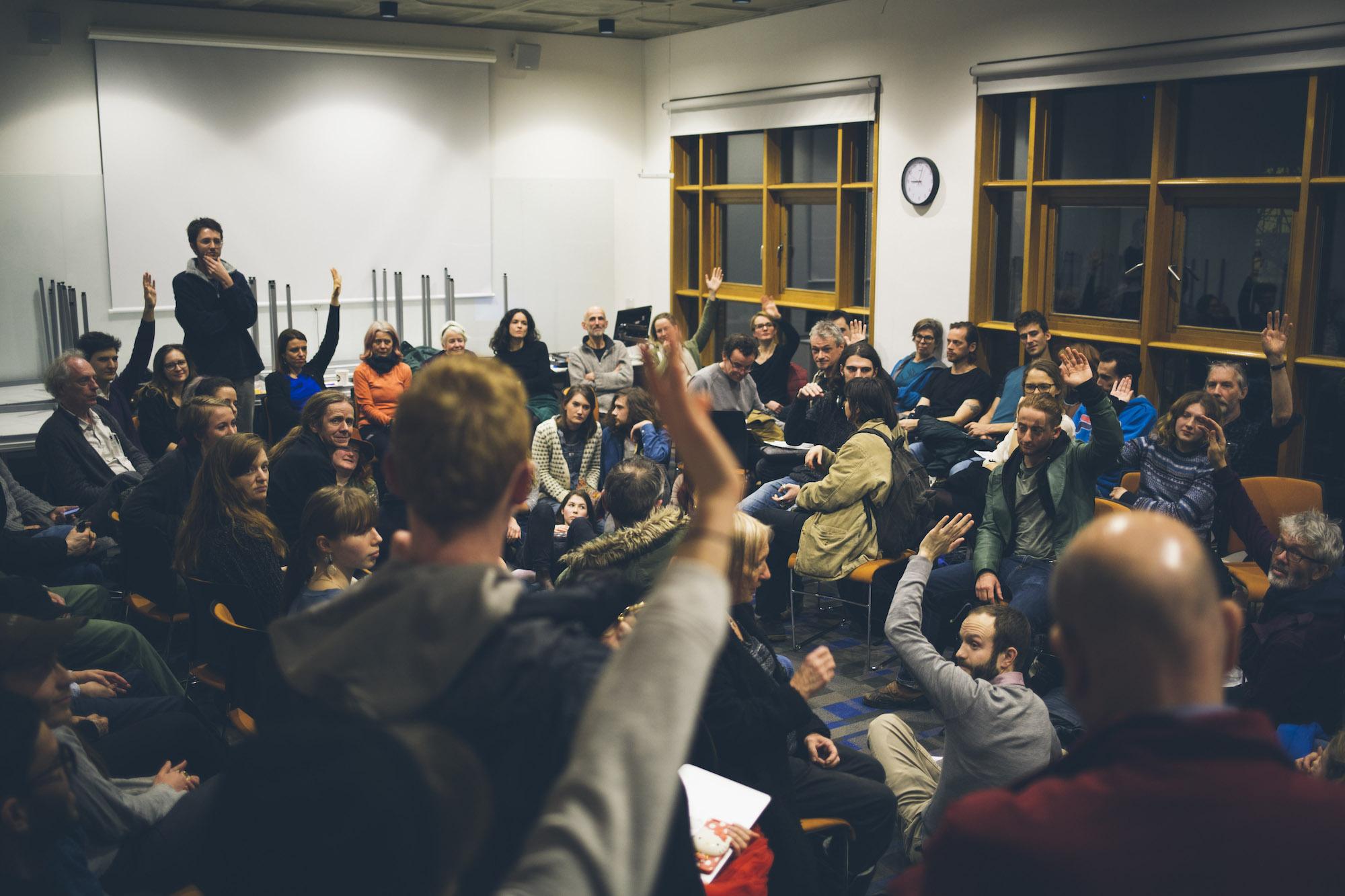
The consequences are expected to be unfathomable, including the burning down of the Amazon rainforest at about a 3 degrees Celsius [37 degrees Fahrenheit] rise. Rapid flooding and desertification sparked by the continued melting of Greenland and Antarctic ice is also predicted to lead to unfeasible global mass migration, with one in nine people forecast to be on the move by 2050. The sixth mass extinction in the history of Earth is already underway—people are dying in wild fires and floods around the world—but it will get worse if nothing changes. The rise of widespread civil unrest and fascism is mooted, as well as the possibility of human extinction within the next ten years.
Gail Bradbrook, one of the founders of XR, shares a frightening analogy of what could be to come: “You’ve got polar bears rampaging in Russia trying to get fed, and what are [the authorities] doing? They’re killing them off. It sounds like an extremist thing to say, but what do people think is going to happen to human beings when there’s not enough food? Who’s going to be killing who? We’re fucked, is the shorthand way we say it.”
This is “emergency mode messaging.” The data presented in the talk could be dismissed as alarmist, but XR focuses on observations by leading mainstream scientists, including Professor Hans Joachim Schellnhuber—who has acted as an advisor to the European Union, German Chancellor Angela Merkel, and Pope Francis—to convey its message.
Anna Hughes, 36, found out about XR through a Google search only an hour before the talk began. “I kind of knew this stuff, but it’s always terrifying to hear it,” she says. “You look at it and think, What are we doing? It’s very hard-hitting.”
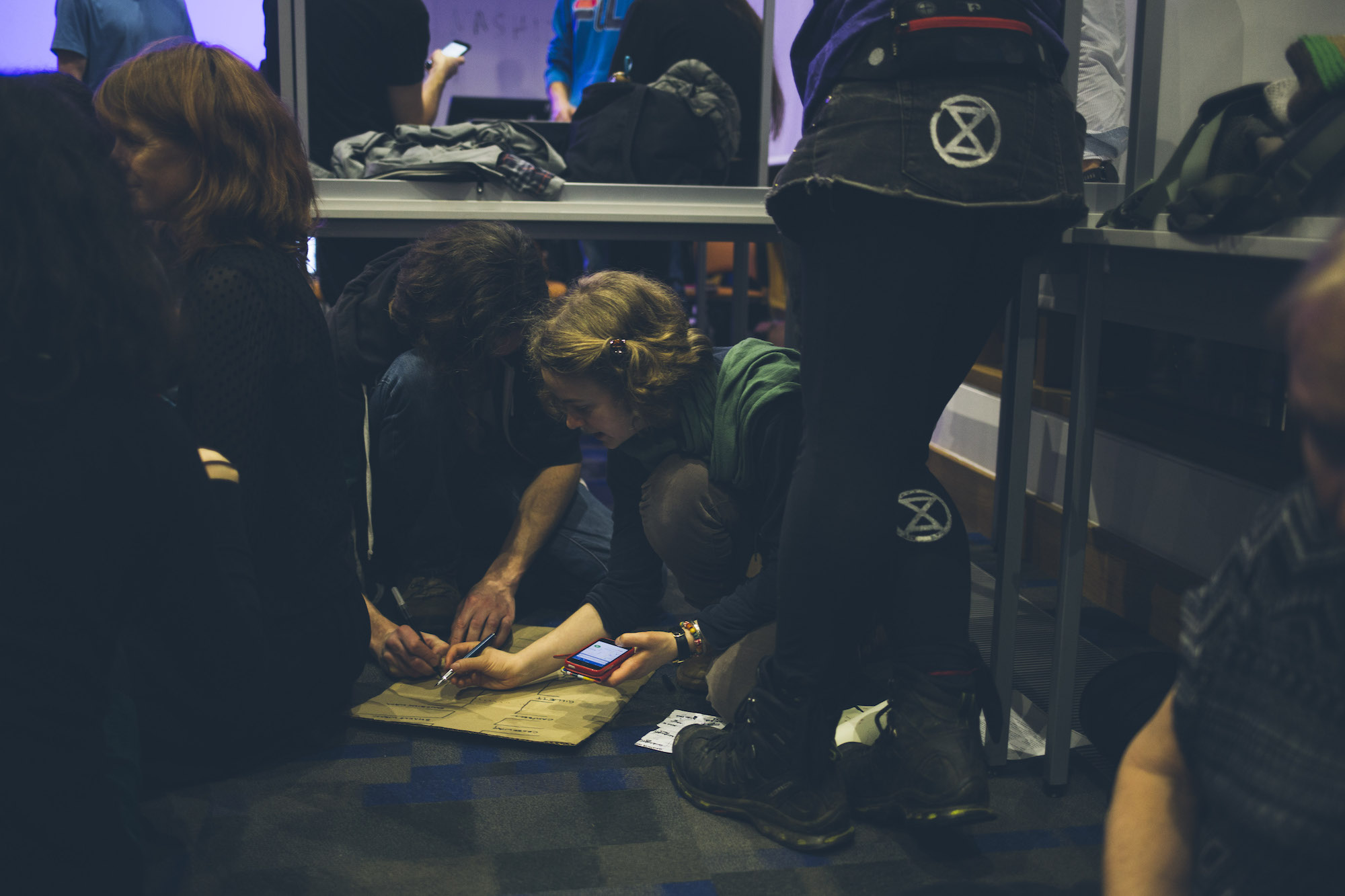
As the talk comes to a close, the room is a mix of emotions. Some people rest solemn-faced in their seats, seemingly paralyzed as the gravity of what they have just heard incubates inside them. Others are motivated, completing forms to put into writing their commitment to taking action. They vow to join XR in using the tools of civil disobedience to pressure the government, which they believe is failing to protect society and the environment.
Among them is 29-year-old Domi Wisniewska, who lives in Hackney. She is signing up to give a few hours of her time each week, around her work in the bakery and charity sectors, to steward events, support others, distribute information, and form roadblocks. “Joining movements like XR just feels right,” she says. “It might be just another climate walk, another street protest, but we have really got to press government. The more people join, the more impactful it will have.”
Joining XR makes Wisniewska one of more than 1,200 people in the UK—and around 1 million people in 65 countries across the globe—who are willing to get arrested and potentially sacrifice their liberty in the name of climate activism. “It’s a small price that some of us might pay for being seen and heard,” she explains, “[for] showing a real concern about years and years of government and business ignorance. I’m not even scared of this affecting my life. Even if I’m taken by the police and charged with civil disobedience, I’m totally fine with it. Obviously, it would be better not to get to this point. For too many years I felt resigned and in a state of inertia. Those years are lost. I’ve got to a point in life where I decided to be active and rethink my participation in the world.”
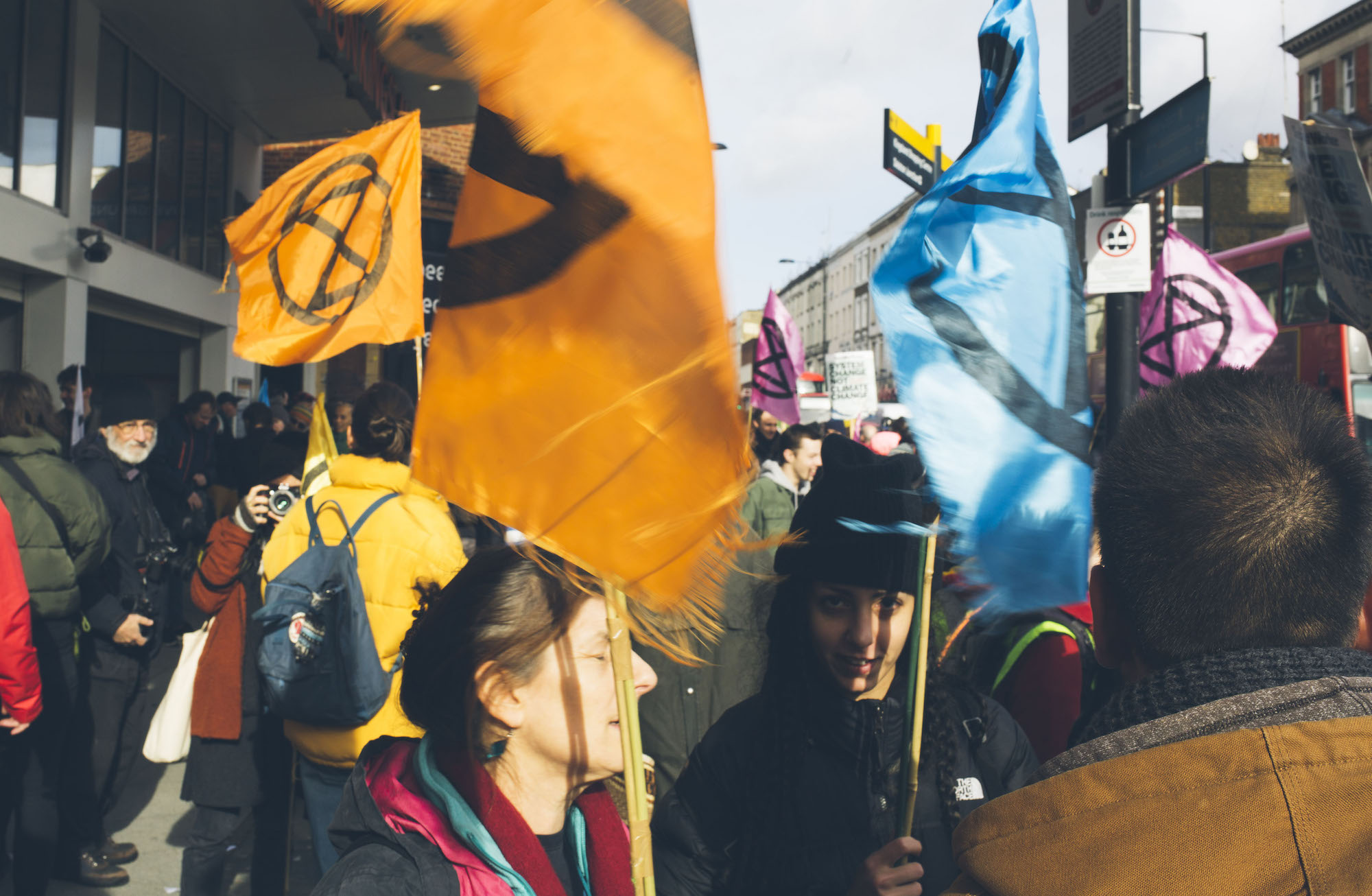
The rapid growth of XR is staggering. It has come a long way since last May, when 15 people met in a cafe to devise a strategy and define a clear set of demands. These include that the government tell the truth about the climate emergency and reduce carbon emissions to net zero by 2025. The group also insists on the creation of a national citizens’ assembly to oversee the changes needed, which XR suggests would require a mobilization similar to that seen in past emergency situations, including during the Second World War.
XR officially launched at the end of October last year, and within a month thousands of its members had already staged one of the largest nonviolent direct actions the country has seen in a generation. They all but brought central London to a standstill when they occupied five of the capital’s bridges—Blackfriars, Lambeth, Southwark, Waterloo, and Westminster—on November 17.
The mass act of peaceful civil disobedience resulted in 85 people being arrested, mostly for obstruction under the Highways Act. Those arrests followed more than 60 others at XR-coordinated acts of rebellion—including 22 arrests when protesters spray-painted “frack off” tags and glued themselves to the windows of the Department for Business, Energy, and Industrial Strategy—in the two weeks leading up to the bridges blockade.
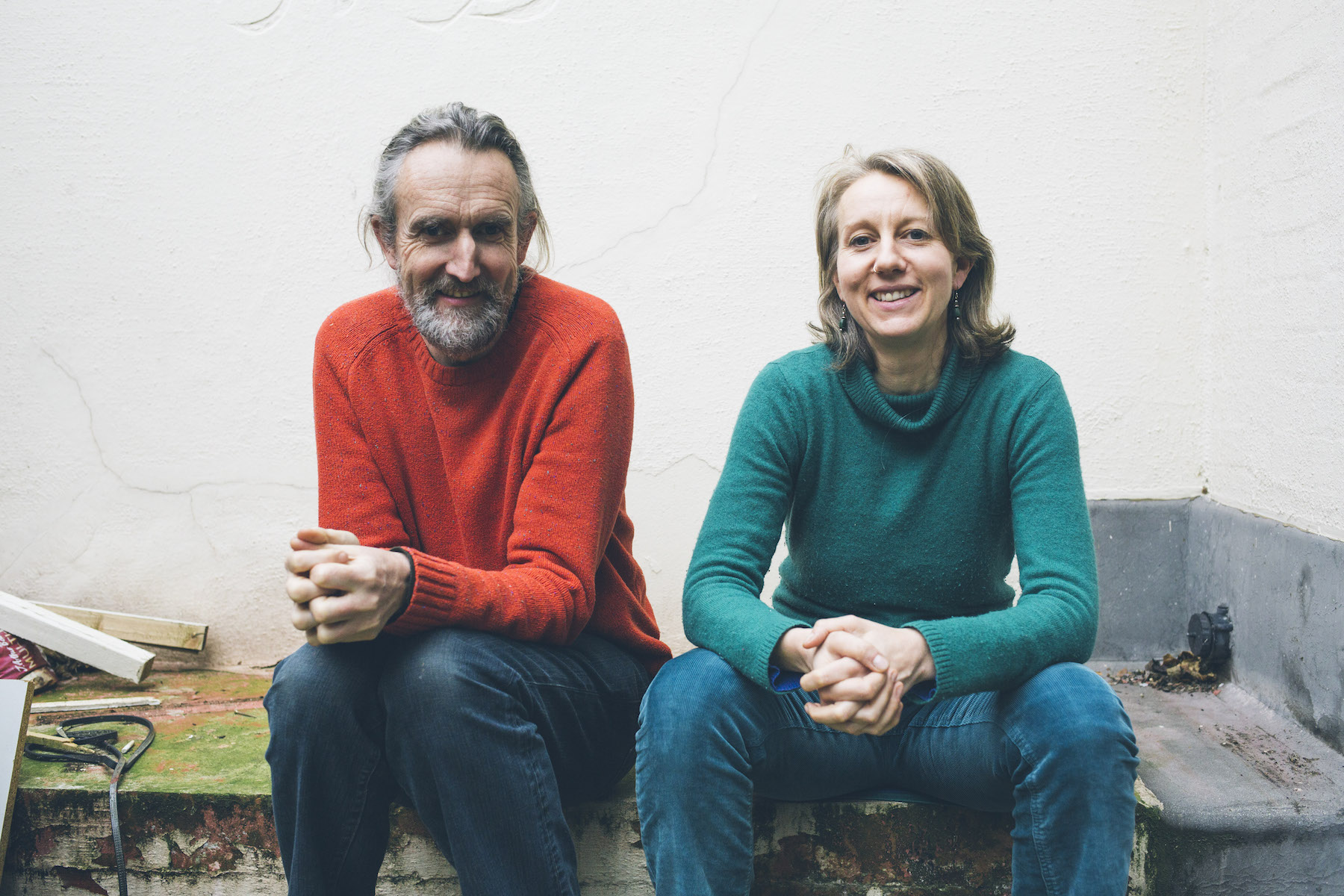
The arrest tally now sits at around 160, but getting arrested is really no big deal, says Roger Hallam —one of the founders of the movement—when I meet with him and Gail Bradbrook in the northwest London home where Hallam is staying.
“You go into a police van, go to a building where they’ll ask you some questions, put you into a cell —you can take your books in so you can have a nice read and a rest. You go for a short interview where you can say, ‘No comment,’ then they’ll let you out,” he explains. “You might get a piece of paper in the mail with a court date. You go to court, you might get a small fine, then that’s it.”
Bradbrook, who is due in court on February 28, charged with criminal damage for daubing graffiti on a government building, describes her stay in custody as a “spa break.” “I did yoga in the cell, meditated, and slept well; somebody brings you some food and drink,” she says. “I’ve been arrested four times now.”
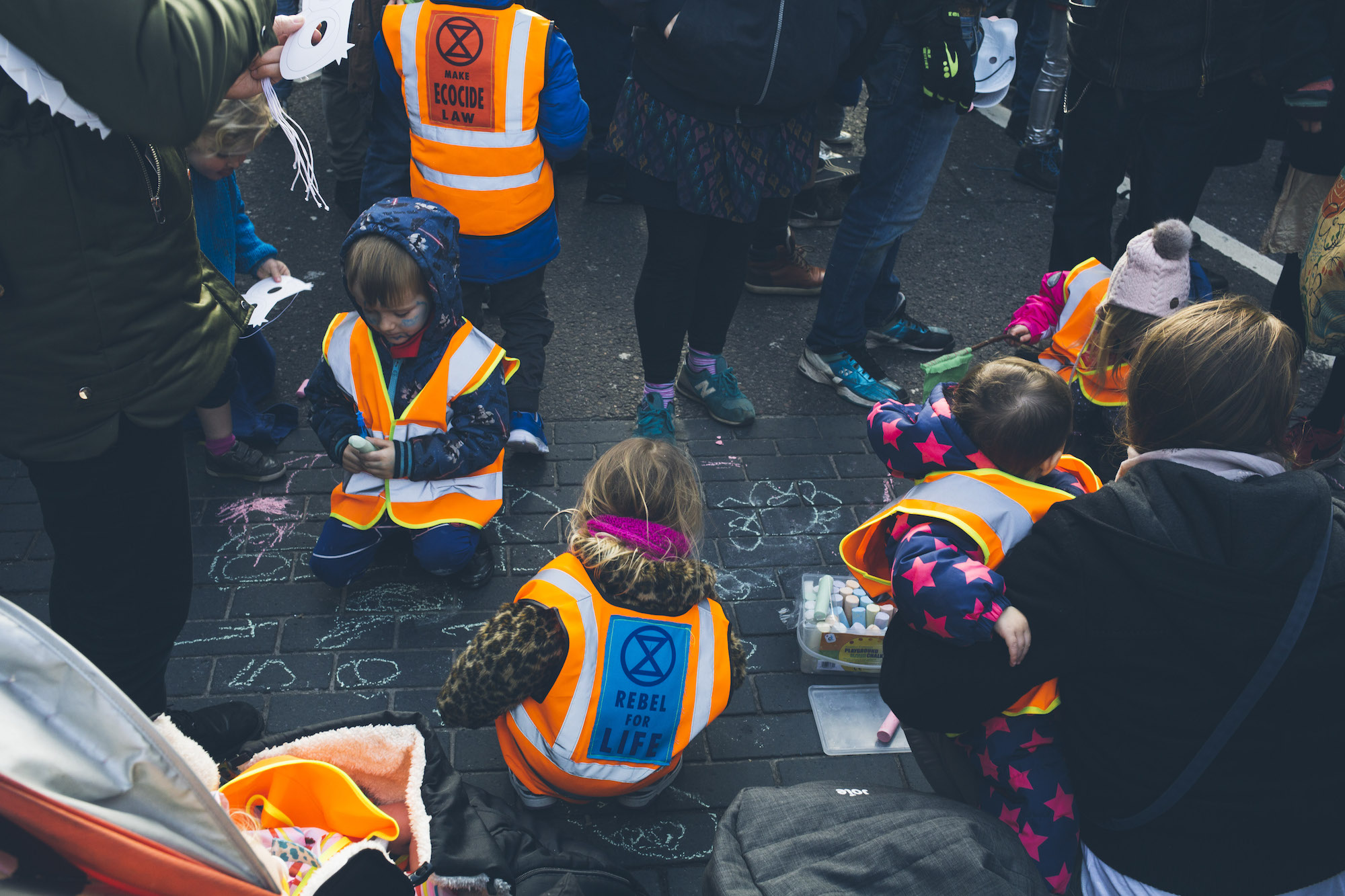
Not everyone immediately takes the same view of being arrested as Hallam and Bradbrook; for some, there are important parts of life that can’t be managed from a jail cell. Still, once they know enough about the cause, many members change their minds. At XR’s first street party—a “creative roadblock” in Hackney—I meet 35-year-old Estelle from north London, who has an 18-month-old daughter wearing an XR-branded hi-vis vest. This is her first action for the movement, after recently watching the XR talk online. It hit her hard.
“The discussion of civilization breakdown, mass rape, mass migration—all of that stuff is real, and we need to think about it and talk about it,” she says. “That has had an impact on my day-to-day mental health, but not in an especially negative way. What I mean is that if you’re engaging with that kind of truth and reality it will affect your ability to exist within a comfort zone and project your life into the future.
“Making plans when you’re faced with that kind of uncertainty—especially when you’ve got a young child—that can be really difficult. It’s not affecting my ability to function, but I am finding myself crying and thinking about my daughter and worrying about it all. The talk convinced me that it’s not going to be like a Hollywood film; there’s not going to be a big event and then you’re going to have time to do something about it. It’s happening now and the signs are everywhere. I am compelled to do something.”
The street party attracts hundreds of people and goes ahead without any resistance, including from the authorities. Some police officers even appear to give their veiled approval of the action. “They’re exercising their right to protest,” one tells me. “Climate change is a worry, isn’t it? Something has got to be done about it, but as police we have to stay neutral.”
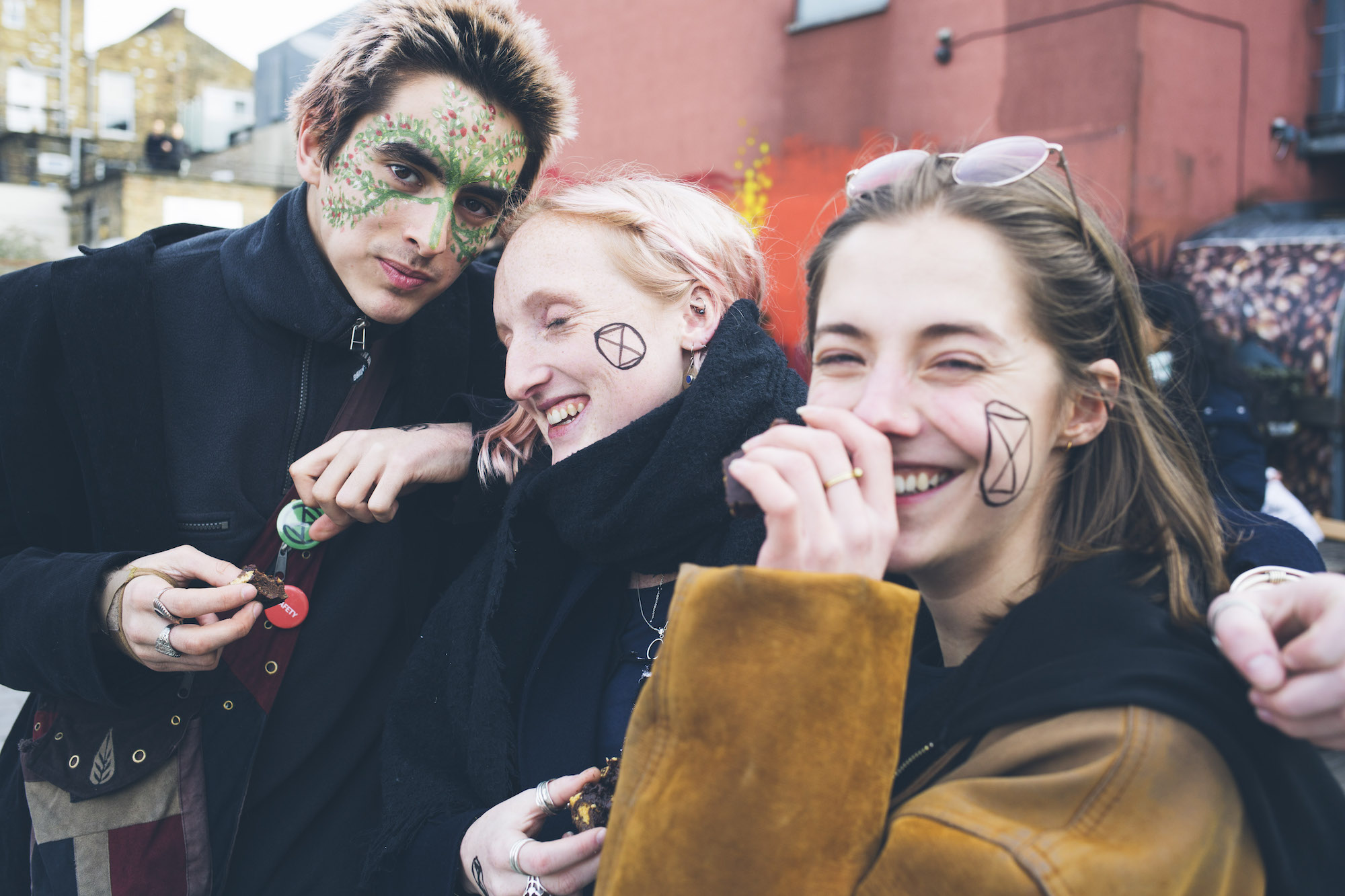
This gathering and other events—from the swarming of London Fashion Week this past Sunday to “die-ins” in major shopping centers—are, however, just precursors to what is being branded as a sustained, full-scale international rebellion, starting on April 15, to demand action on the climate emergency. The preparations include training people in nonviolent direct action, teaching them how to de-escalate tense situations, how to interact with police and what to do if they face arrest.
William Skeaping, a member of XR, says: “All these events going on at the moment have a purpose: bringing people together, asking them to sign up, getting the conversation moving in a way that appears to be vocal and out in the streets. At the same time, it’s normalizing the idea of protest, to see people blocking roads, for police to be standing round without a confrontation. The entire process means nonviolent direct action can become something that appears to be much more accessible and is happening on your doorstep.
“Moving toward April, we’re testing and pushing to see how we can best encourage people to realize this is a part of everyone’s lives. Asking people to jump from watching something on TV or reading a newspaper article to suddenly running out on the streets and getting involved is quite a major leap, whereas if the concept of nonviolent direct action has become part of the daily conversation, we’re in a much stronger place. The barriers to entry are lower and it’s much easier to make that leap.”
The daunting prospect of that dive must be overcome if XR is to stage the “major political event” it is attempting to manifest in April. Hallam says the plan is to gather about 10,000 people in central London alone to create a “Glastonbury-esque” atmosphere, and permanently occupy several roundabouts day after day, until the government creates a response in a substantive way to XR’s demands. Negotiators representing the group will be on hand to talk to the government.
“If the government doesn’t meet our demands, central London will get progressively more blocked off through mass participation actions, which could mean people sitting in the road forever, not going,” he adds. “The idea is that the elite, the corporate media and the government get a shock and realize that people power is on the way. The logic of what we’re going to achieve here is going to be either an economic blockage of central London and/or mass arrests.”
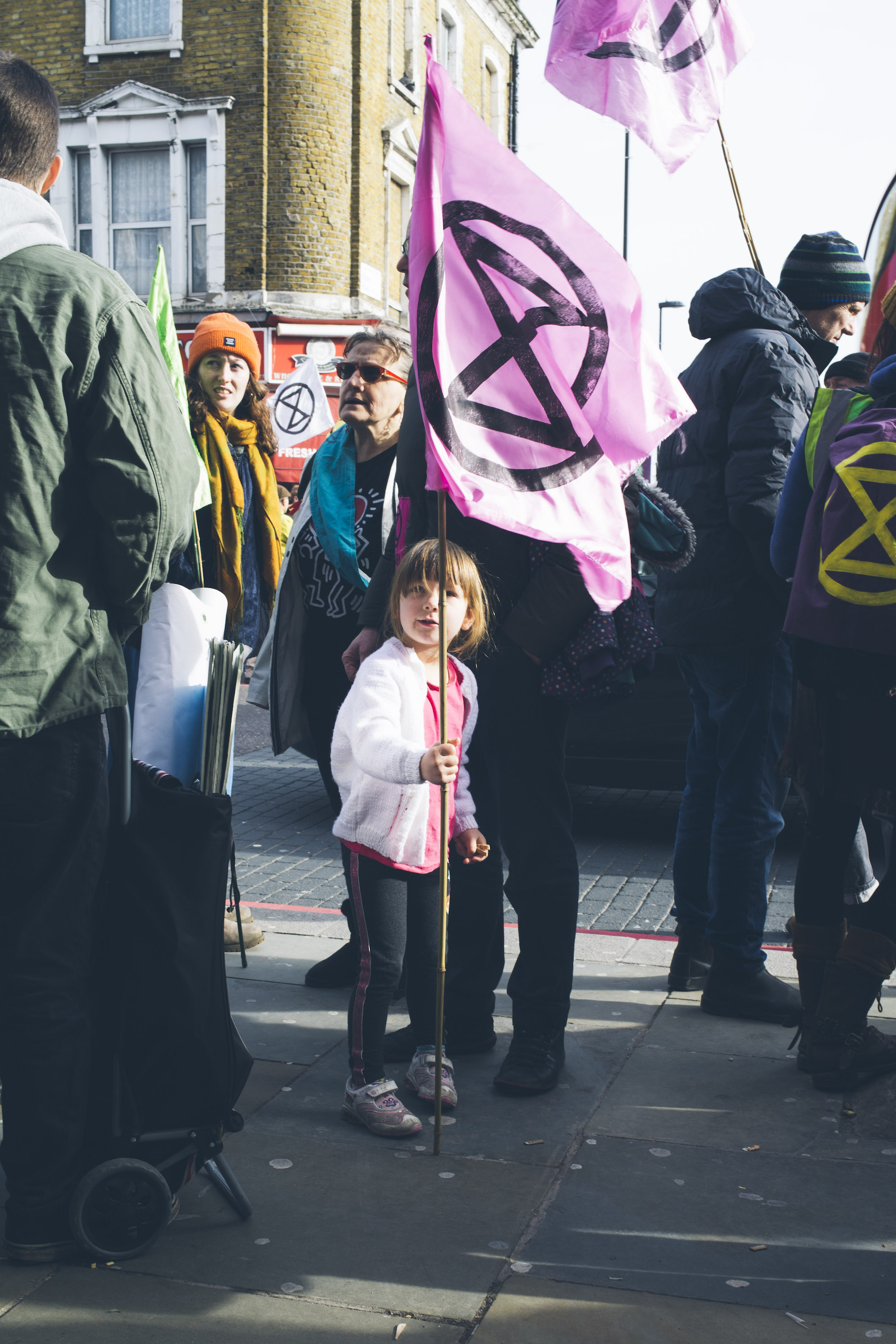
The possibility of mass arrests is not a bad thing for XR, according to Hallam: “Arresting thousands of people means [the government] will have a major legitimacy problem on their hands. That may also backfire [for the authorities] and more people could come down out of solidarity and curiosity. It’s going to be a big, chaotic mess for them, and the way out of it is to take their responsibilities seriously as a British state and say they’re going to call a citizens’ assembly to find a way out of the crisis.”
While not typical in the UK, this action, says Bradbrook, is common and has led to change in the global south. “People say they’ve had enough and they get on the streets and they stay there until it’s sorted,” she explains. “That’s going to be the deal.”
The group highlights movements—including the suffragettes, the civil rights movement, early trade unionists, and the overthrow of Slobodan Milošević in Belgrade—as past examples of mass civil disobedience getting positive results. But is it enough to trigger the enormous shift needed to save the planet from the certain doom being foretold?
Bradbrook says it’s great that the UK is leading the rebellion, but that the protest will need to go global, with amendments in international law, trade agreements and climate agreements crucial. “I also personally think—as do many others—that a shift on consciousness is needed toward one where we understand that we are in a relationship with the earth and all living beings, that we have agency,” she adds. “That life is worth fighting for.”
Hallam says it is inevitable that such tactics could bring governments to their knees in western democracies. “It’s a piece of piss to bring down the government,” he says. “We will have initiated a new form of resistance in political culture, and people will be looking at that around the world. Sooner or later, the government is going to have to move on this and challenge the power behind the elites.”
Whatever happens in April, Hallam believes the movement will have already won because of what they can expose by adopting a “dilemma action” approach. “We create a dilemma for the government, which is either leave us alone and have the embarrassment of having their capital city closed down, or they use repressive action and basically show they are willing to act in order to maintain the interests of the elites. That would be very damaging because it shows them up for what they are, which is engaged in the greatest crime in humanity: not acting on the climate emergency. It brings radical evil into the open.”
For some of XR’s newest and younger members, this rising up together is extremely empowering, particularly at a time when they feel locked out of so many of the other discussions that affect their future. Famke, 17, is at the Hackney street party with her dog, Kojak. This is her first action. “I want to change our relationship with climate change,” she says. “I think politics is the way to get this change.”
Paul, 20, who’s from the US and studying in the UK, is getting fired up for the mass rebellion. He says he believes XR could help save the planet. “This is a group that is doing something that might actually have an impact,” he tells me as the street party, also his first action too. “Anything could happen in April.”
Sign up for our newsletter to get the best of VICE delivered to your inbox daily.
This article originally appeared on VICE UK.
Follow Emily Goddard on Twitter.
This article originally appeared on VICE UK.